#FREEVLDS8
Explore tagged Tumblr posts
Note
Omg hi! Hello! I'd noticed recent traffic to my old metas and was wondering where it was linked from! You don't know how happy I am to discover your blog! I wanted to reach out/connect and let you know we're still around/have our own discord server. We're happy to provide any of our materials/research that might be of help, and and and omg just wow. I am so incredibly excited to discover there are more people who CARE about this still!!
OMG HI, HELLO!? Firstly, WOW. I was a big fan of your metas and analysis' back in the heyday with Team Purple Lion! I would love to (if you're willing) to share your sources and materials as well.
Secondly, I can't wait to share what we've found too!! It's been a profound rewatch, that's for sure.
Thank you so much!!
31 notes
·
View notes
Text
Lotor in a Komar Robeast - a Speculative Meta
Listen, I said I wasn’t going to write any more VLD metas, but this one is borderline fanfic, so I have an excuse. My theory is a bit stretched, like a thin rubber band ready to snap, but hey, it’s always fun to theorize. I’m just throwing it out here for funsies.
So, first off, what are the easiest and fastest ways to change the course of an already animated story?
— Static images are easy to alter - Lotor’s cOrpSe comes to mind. Easy to draw a bunch of purple spaghetti over his body.
— If there are changes in the script, calling voice actors back to record new dialogue is also cheaper (and faster) than applying major changes to the animation itself (re-recording dialogue is called ADR and it’s used in the industry on a regular basis).
With that in mind, here’s where I’m applying my theory:
At the end of Knights of Light Part II, Allura remains unconscious, while all the other Paladins wake up from the entity-assisted trip to Honerva’s mind:

From here on, I (like many others before me) hypothesize that she’d continue her metaphysical journey and finally meet Lotor — a natural consequence of the fact that he (his subconscious more exactly) enticed Allura to follow him in the Clear Day episode (“Follow me”? And then we never saw him again? Hello? Anyone there?).
As seen in the “Genesis” episode in S8, Lotor is boiling in his own rage — a rage of galactic proportions, magnified by the rift quintessence. Similar to how she woke the Old Paladins up from the darkness inside Honerva’s mind, Allura would now have a chance to awaken Lotor’s consciousness.
The difference between Lotor and Alfor et al. is that Lotor also retains his physical body — and I posit it would not look as horrid as published in canon. After simmering in the quintessence field among entities, it would make more sense story-wise for Lotor to resemble his parents’ transfiguration. A vampire-like appearance. The flecks of purple light emanating from him in the (supposed) coRpSe scene suggest that as well (Remember Zarkon and Honerva’s eyes, effusing motes of eerie purple light after coming back from the rift?).
Here’s where I’m deviating from the traditional theories:
The outcome of Lotor still retaining a viable body would be that Allura would completely wake him up from his vampire state: mind and body.
In other words, Allura would revive him remotely, via the entity connection. She wouldn’t need to storm the pyramid. Or, to quote Allura herself in the very last episode of S8, she’d “change the quintessence within [his] vessel/body from a destructive force into a life-giving force” (note that in canon she applied this technique to Honerva, while they were in the Connected Consciousness Plane, so… also remotely). As per Allura’s own recount, this was something that Lotor helped her learn.
This would bring us to the next point, as we see it in canon:
At the beginning of S8E12 “The Zenith”, Merla unexpectedly comes to the Paladins’ aid, parrying a Komar robeast’s strike against Voltron:

Pidge exclaims: “It’s the Altean!”
“Why is she helping us?” Lance asks.
Merla pleads with the Paladins. “Please, do not harm them! They were misguided, much like I was. We all were.”
We never actually see Pidge, Lance or Merla talking, we only hear their voices while the robots carry on with the battle.
This sneaky little snippet of dialogue is where I think stuff might have been altered.
Why?
Because Merla freaking died in the previous episode. Honerva blasted Merla’s mecha to fine cosmic dust, and we witnessed that in a mighty well animated scene, for that matter.
So. Who might have actually piloted that Komar robeast?
Well…
How about… Lotor? What if Lotor’s “do not harm them” was swapped with Merla’s voice?
Freshly awoken from his mega mental breakdown, but still refusing to accept Honerva as his mother — thus putting up a big fight against her (and consequently pushing Honerva to such batshit insanity where she’d decide to search for a child-Lotor in another reality), Lotor would eventually manage to escape the pyramid aboard a Komar mecha. Abandoning Sincline in this case would also serve as a symbolic gesture of departing his past life and actions, and joining the Coalition for good. (Also, in Allura’s vision in “Clear Day”, the Komar robot had a bit of a sacrificial symbolic role, so there’s that as well).
Inserting Lotor here would be an effective action sequence, with a bigger story impact than Merla’s — and it would flow nicely, as he’d arrive in the nick of time to help the Paladins. Not to mention, it would save a lot of time and budget, by skipping that extra episode about storming the pyramid.
Look, I love the ‘storming the pyramid’ idea and all the art that’s been done so far with it. I’d love to see more! I wrote a fanfic around it, too. But what if there was a more streamlined approach?
Also… Also… This action flow would explain the unprofessionally chopped frame (rip Hunk, we only see your shoulder) that follows immediately after the Merla-helps-Voltron scene. (Oh, how about Lance’s “Why is she helping us?” rolling right during this frame? We don’t even see Lance’s mouth - how convenient!)

In the unaltered version of this split screen (there must be an uncropped version, because otherwise… where’s Hunk?), I posit there wouldn’t be any Merla; instead, we’d see the newly-arrived Lotor, the Paladins, and the two remaining Altean warriors. And the convo would flow something like this:
Pidge: “It’s Lotor!”
Lance: “Why is he helping us?” (Or perhaps he would say something else completely? We can’t see his mouth; I guess it was easier than re-animating his lips to the new dialogue?)
Lotor: “Please, do not harm them!” [Optional: “They were misguided — much like I was. We all were.” — this would tie in with what Allura said about him in the Connected Consciousness scene: “Lotor may have been misguided, but ultimately he wanted to preserve life.”]
Scrolling further into S8E12, there are two almost identical semi-static scenes (an Altean character is animated briefly), separated by about 5 minutes (min 12:08, then min 17:00). The background dissimilarity is what triggers my suspicions. Remember I said static images are easy to alter? Spot the differences between these two pics:
Image 1 - minute 12:08:

Image 2 - minute 17:00:

In the second shot Matt and N-7 are gone, but more importantly… the Balmeran alien on the right has been replaced by Merla, and her Komar mecha looms in the background. See how easy it is to switch characters in static scenes? It’s canon. Boom. Proof right here.
What if… that character was actually Lotor? If he was supposed to be in that mecha instead of Merla, this would be a great opportunity for him to join forces with his beloved Alteans, and… and… express his own magical powers! (Oh, magical Altean Lotor? We’ve been waiting for this since Oriande, haven’t we? Here we go!)
Not to mention the super-symbolic gesture he’d make, of giving up his own quintessence — after syphoning it from other Alteans in the past.
Ultimately though, we know that the Balmerans & the Coalition’s efforts fail, as they’re unable to contain the rift. Their reality collapses. Meanwhile, Voltron-Atlas misses their entry point to the next reality. They’re all defeated. Honerva reaches her target reality. There, she meets cute little Lotor, gets rejected (again!) by him, and looses her shit completely.
Then, out of thin air, Voltron-Atlas reappears. May I ask how? Because damn sure, canon never explained it.
While my imagination is exhausted here, I have a couple of options, sourced from a previous meta of my own, as well as @violethowler ’s meta. In either case, the idea is that a supernatural being from beyond realities must have helped them, perhaps akin to the Sphinx in the VLD comics — maybe a Lion Goddess (foreshadowed in S1)? Perhaps they must pass some tests? The riddle of the Sphinx? Perhaps their experience in S7, “The Journey Within” was the Goddess’ test, and they already passed it? Unity, friendship, hope… All that good stuff.
And here, in the Nowhere Land beyond realities, I speculate that Lotor reunites with the Voltron-Atlas team. A seven-unit team (as hinted through Kolivan’s interview in “Day Forty-Seven”). According to a previous analysis of mine, there are animation glitches that hint at Lotor being present in the final scenes in the Connected Consciousness.
Like I said, this is a highly speculative piece. More fuel for fanfiction though.
One thing I’d like to make clear as I close my analysis. When I talk about altering an already animated story, I’m referring to executive meddling, imposed upon the talented crew that poured all their love into this show: the EPs, the writers, the animators. You know, the whole “toys for boys” meddling issue. Imo, the show runners deserved better, just like this story. I’m simply speculating on what could have been.
#vld meta#voltron meta#voltron#vld#freevlds8#lotor meta#lotor#lotor deserved better#voltron legendary defender#jesseblue writes#this theory might have plotholes but I’m having fun with it#dialogue changes are impossible to guess so that’s a big reason to mark this meta as highly speculative#that being said though…#Lotor in a Komar robeast is my new head canon LOL#I’ve noticed the two separate shots with Balmera and the Alteans a few years ago but never made much sense of them#sorry Merla - this theory wipes you from existence#which means Merla wouldn’t show up at the very end of S8 on New Altea either#thank you for reading
15 notes
·
View notes
Note
Hi! I’m falling back down the vld rabbit hole and am once again consoling myself with how the series could/should/was meant to wrap up its various character and plot arcs and come to a satisfying and well written ending with all of tpl’s metas that i found really enlightening back in the day. So first of all, thanks for all the time and energy you guys put into everything you’ve collected/organized/posted!
Second, do you know if any of felixazrael’s metas are still available anywhere? With the blog deactivated, tumblr has kicked all the links on the old posts.
Third, do you have any thoughts on how unavailable vld seems to be now? Amazon doesn’t even have s7 and 8 available for purchase.
Thanks and have a fantastic day! 🌼
Hello hello! :D Welcome back to the VLD rabbit hole! You are so sweet! I shared your lovely compliments with my teammates, and we are so pleased to hear from you! I also occasionally re-read the old metas; there are a few things I'd change about them if I was to revisit them today, but on the whole I think they stand the test of time pretty well, and I'm proud of all the hard work and love we put into them. I keep meaning to write a retrospective of sorts to reflect on the things that have and have not changed since then, but I can never quite seem to find the words for articulating all the feelings that'd be necessarily wrapped up in all that. Felix is a difficult topic. They voluntarily withdrew from the community and asked that all copies of their work be pulled down and disposed of. Out of respect for them and our friendship we complied with their request, even as we as a whole are staunchly against deleting fandom history. It's a complicated and frustrating situation, but they have the right to decide what happens with their work. I'm sorry, I believe all of Felix's metas are lost now. As for your third question... OH BOY do I have thoughts! :D I have many thoughts about the availability (or lack thereof) of VLD. So, as of this writing, the first two DVDs (covering Season 1-2 [production season 1], and 3-6 [production season 2], respectively) are out of print and difficult to come by. Seasons 7 and 8 [production season 3] were never released at all for purchase. I believe there are still several places you can purchase digital copies of the first 6 seasons, but again, seasons 7 and 8 were never released. There could be several reasons for some of this - the DVDs were of low-quality and never sold particularly well (why would you buy a low-res version of a show you could watch on Netflix in HD?) so it's not too implausible to imagine that 7 and 8 were simply never printed because the expense of printing was more than the expected profit. That's plausible, that's reasonable. What's much less so is the unavailability of the episodes for digital download. Making something available for purchase digitally is so inexpensive, by comparison to DVDs, that it's basically free. And with the size of VLD's fandom (even today), you'd surely get enough sales to cover the already negligible costs. So it's not a money issue. And it's not a demand issue. What have we got left? The way I see it, there's two main options here, and they both boil down to: something regarding seasons 7 and 8 being edited is interfering with making those seasons available for purchase.
Option 1: It's something legal.
The rights for Voltron have always been a tricky thing. It's owned by the private company WEP (World Events Productions) which leases out different pieces of the rights to other companies so that they can make the shows and the merchandise based on the brand. I, and my team, fully believe that Bob Koplar, the CEO of WEP, is the man responsible for ordering the edits to Seasons 7 and Season 8. The "why" of the matter is still speculative, but it's pretty clear that he's responsible. (I can get into the details if asked, but we'll be here all day if I do it now, lol) So Koplar holds the rights to the brand, but DreamWorks, which made VLD, holds the rights to the individual show. If there's a legal conflict between the companies, say, over which version of the show can be released... then that could be why we're not seeing those episodes. Option 2: It's spite. Following on the last option, with Bob Koplar having levered his control over the Voltron Trademarks to force DreamWorks to make edits to their show, it's very possible one or the other is preventing the release of the episodes in an effort to screw with the other.
From Koplar's side of things, he's small and petty enough to rip an entire completed show - millions of dollars in investment in animation alone - to pieces for reasons that seem to amount to him disliking the story direction. He'd absolutely hold up the release of the episodes if there was something about them he still didn't like - and there's plenty still there for him to hate! (*cough* like the caricature literally named after him in the Season 7 episode "The Feud" *cough)
From DreamWorks' perspective, they had an entire completed show - millions of dollars in animation, remember! - ripped to pieces by a power-tripping, petty, little man. Which they then had to shell out additional funds to pay to reconstruct. The resulting product, which they were contractually obligated to release to Netflix, was then rejected wholesale by the fanbase, completely destroying any possibility of a franchise for one of the biggest hit shows they'd seen in years. We're looking at tens of millions of dollars down the drain. Would a company like DreamWorks turn around and screw over Koplar in turn for what he did? Yeah, I think they might. All in all, I can't say why they're not available... but I do know that back, immediately after Season 8 aired, WEP's storefront (Voltron Store) and social media accounts were claiming that the final DVD would be out by "the fall", which, given the timeframe, was presumably fall 2019. So at some point there was a plan to make those episodes available, at least on WEP's part. This, however, was likely before it was revealed to Bob that the episode "The Feud" was mocking him specifically. I can't say whether those episodes will ever get an official release, but I can say that if they do, it's going to dig up this whole entire mess all over again. And I'm pretty sure that neither party involved wants that. WEP has their new movie in production, and DW probably see the entire show as something they'd like to forget. Releasing those episodes will bring them both nothing but bad PR.
Thank you so much for your message! I enjoyed receiving it, and I had great fun writing out this answer! I'm always happy to talk Voltron, Voltron theories, Voltron related media. Have a lovely day!
#voltron#vld#voltron legendary defefender#teampurplelion#hate tries to meta#team purple lion#freevlds8#bob koplar#asks answered
18 notes
·
View notes
Text

DID HE. DID HE JUST CONFIRM THAT LOTOR WAS TRACED OVER.
#freevlds8#idk if this confirms but it’s fueling me#voltron#shiro#josh keaton#takashi shirogane#LORD#season 8#voltron season 8
75 notes
·
View notes
Note
Wait. What happened with Bob Koplar and Voltron? There were reasons as to why it was so bad?!
There absolutely are.
And before I go any further, I have no clue if you already know who Bob Koplar is, but if you do, then this little explanation will just be for anyone reading this who doesn’t: Bob Koplar is the current head of WEP (World Events Productions), the company that made the original show in the 80s and owns the Voltron brand. Dreamworks at the time of the Netflix Voltron series’ production only had the rights to adapt the existing Voltron material and did not own the brand outright. All scripts/episodes for VLD had to go through Bob for approval (by his own admission, although the video where he acknowledges this has sadly been deleted from Youtube).
So with that explanation out of the way, the reason the final season of Voltron is so bad was because the showrunners and writers at Dreamworks had a very specific story they were trying to tell, while based on comments made by cast, crew, and Koplar himself over the years, Bob wanted 1) a glorified toy commercial to sell toys to 6 year old boys, and 2) a successor to the previous Voltron series, Voltron Force.
Based on all the evidence found in and around Seasons 7 and 8, the crew’s plans for the final seasons would have involved revealing that Lotor was still alive in the Rift, that he was innocent of the crimes he had been condemned for, and that he would reconcile with Allura and Team Voltron before joining them in the final battle against Honerva.
Bob found out about this while the crew was making Season 7 and ordered them to change it. Based on interview comments and the history of the Voltron brand, the most likely reason was because he wanted Lotor to remain a villain so he could be reused as the antagonist of a sequel series. The crew complied and removed much of the content surrounding this plotline from Season 7, but then reworked it into Season 8 and tried to push for their planned ending anyway, banking on the hope that by the time Bob found out they’d defied him it would be too late for him to do anything. Instead, the showrunners were forced to cut out multiple episodes’ worth of footage and then rearrange what was left in order to have the number of episodes their contract with Netflix obligated them to release. (A summary of the most notable evidence of changes within the season itself, along with a rough outline of what the final season should’ve looked like based on what was removed, can be found here)
And this all happened after production was already completed, as even the animators and most of the voice actors were surprised by the version of the final season we got.
Bob has also been implicated by multiple interviews with cast and crew as pushing back against the crew’s desire to include queer characters and relationships in the show, and prevented them from including any same-gender romance between the paladins.
If you’re interested, the group of fans behind much of the research into the Bob-mandated editing of Voltron Season 8 has put together a few reconstruction videos depicting an approximation of what the unedited versions of certain episodes would have looked like.
55 notes
·
View notes
Text
Okay, so I was watching this panel again for fun and when Kimberly is asked if Allura has the power to bring people back to life at 40:00, AJ makes a face and immediately looks to Kimberly who pauses for a moment and shares a long, pondering look with him across the table to which he smiles and replies with a laugh: “Don’t look at me. We are but puppets.”
Maybe I’m just reading into it or maybe this has already been discussed years ago, but why would they have this exchange if the question had nothing to do with Lotor/AJ? Could this be hinting at the theorized original storyline in S8 where Allura essentially brings Lotor back from being trapped eternally as a robeast? Or is this interaction merely a coincidence?
youtube
#voltron#lotor#allura#lotura#prince lotor#princess allura#kimberly brooks#aj locascio#vld#freevlds8#teampurplelion#voltron legendary defender#voltronmeta#Youtube
44 notes
·
View notes
Photo
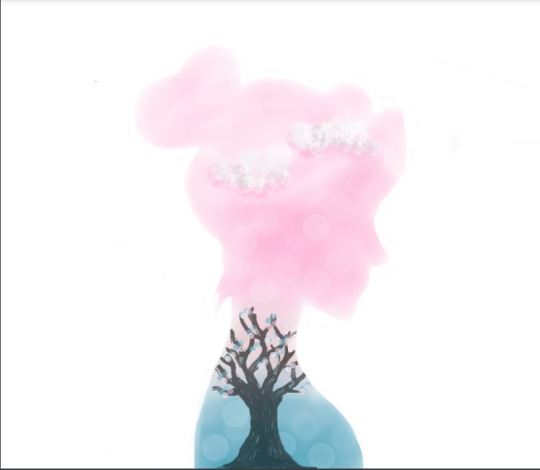
So I made this...like 2 years ago now (whoa that’s a weird thought) and it is my first foray into digital art, I never thought I’d share it but the lovely @praetyger saw it and persuaded me to post it so here it is! It’s meant to be a silhouette of Princess Allura from Voltron: Legendary Defender, the pink and blue symbolising her status as Pink Paladin, pilot of the Blue Lion, and the tree is the same one that Allura heals in s8ep1 Launch Date. (Please don’t repost or tag as A/llurance)
21 notes
·
View notes
Photo

[ID: A screencap of Lotor facing away from the viewer at the lighting of the Kral Zera, pink light shooting out on either side of him at shoulder level before a purple-tinged night sky. Superimposed on the top-left corner of the image is the text “On 10.23.2019...” and on the bottom-right corner is the text “Rise and Atone”. End ID.]
While it’s all well and good to write meta analyzing what was done to VLD seasons 7 and 8, and another thing to talk about what was originally present, it’s completely different from seeing it yourself. We’ve already successfully reinserted where S8E2 “Shadows” belongs in season 7 of VLD. Now join us on October 23 as we present Episode 1 of our educational reconstruction of VLD Season 8: Rise and Atone, “Launch Date”.
With the help of an amazing team of artists and voice actors, Team Purple Lion is eager to show the fandom what once was to the best of our ability, using literary elements and devices preserved within VLD S8. We have found some truly amazing scenes, and found closure for arcs that not even we anticipated, but uncovered through our research.
Will you rise with us?
@felixazrael @crystal-rebellion @voltronisruiningmylife @leakinghate
#RiseAndAtone #HonorYourChildren #TeamPurpleLion
252 notes
·
View notes
Photo
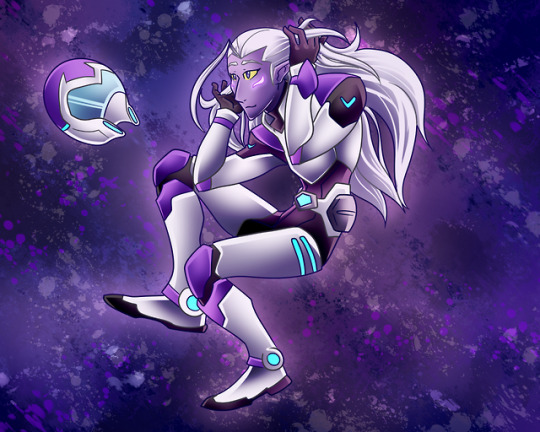
I can’t believe they actually animated a plot for Lotor as a paladin in Season 8 but we never got to see it T^T wanted to draw a purple paladin for myself
Yes, someone forcibly re-edited the last season post-production to remove Lotor from it, among other things. Read all About It Here (LONG post, but the most undeniable evidence is presented toward the mid-end)
#voltron#VLD#lotor#freevlds8#vlds8#vld s8#voltron: legendary defender#ive been unable to not think about this for the past few days u guys its plaguing my mind#mmkart
163 notes
·
View notes
Text
Was Season 8 of Voltron changed?
This masterpost gathers all the evidence indicating the technical weird aspects of Season 8, disregarding possible animation errors. It is not a post about theories of what happened or what’s the truth. By the end of this post, the goal is for you to form your own opinion.
The information gathered here was a collective work of many fans. If you know or found something relevant to this topic, please feel free to message us. We promise to respect the anonymity of those who give us more information. If by the end of this post, you believe something is wrong with Season 8, please consider signing this petition. Disclaimer: This blog condemns any hate towards the staff and creators of the show. Please channel your frustration to Dreamworks or Netflix.
Weird cuts and inconsistencies
Scenes from Episode 1 “Launch Date”
> First scene you have Keith, Lance, Allura. > Second scene you have Keith, Allura, Lance.
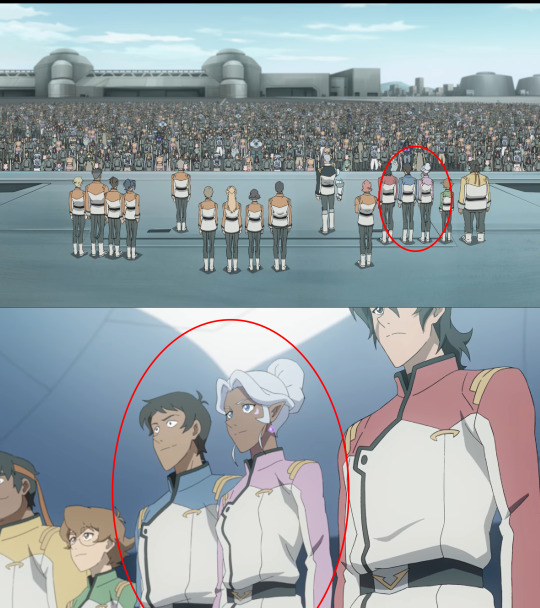
Scenes from Episode 5 “The Grudge”
> Audio description saying Zethrid points the gun at Shiro. (click to see the video)
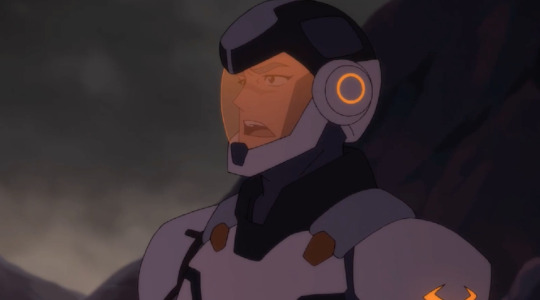
> Audio description not acknowledging Ezor’s character. (click to see the video)
> Ezor is never acknowledged by other characters in these scenes.
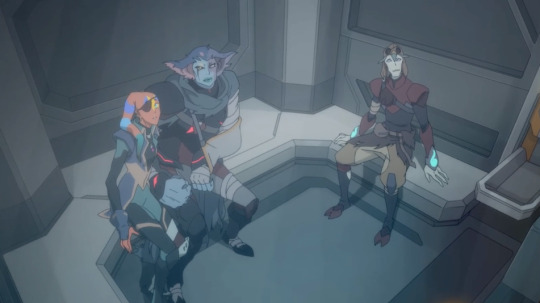
> Ezor in season is voiced by Kimberly
Ezor’s voice from season 8 compared to Allura’s voice pitched up (click to see the video)
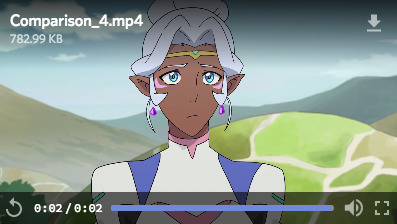
Ezor’s voice pitched down video (click to see the video)
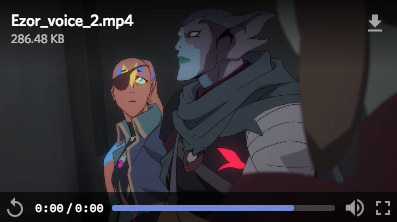
> Zethrid’s “Trust Me” recycled from season 7 (click to see the video)
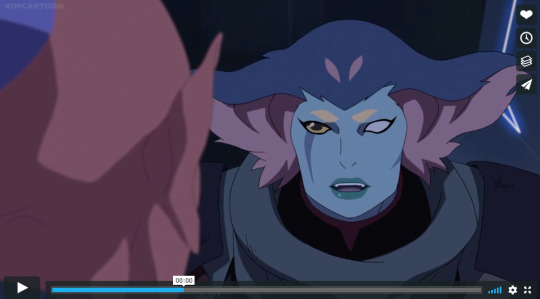
Scenes from Episode 8 “Clear Day”
> First scene you see the MFEs, Acxa, Veronica and “Curtis” in the background. > Immediately after, the next scene you have “Curtis” cheering for Shiro.
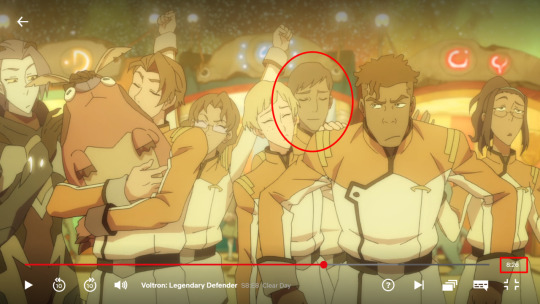
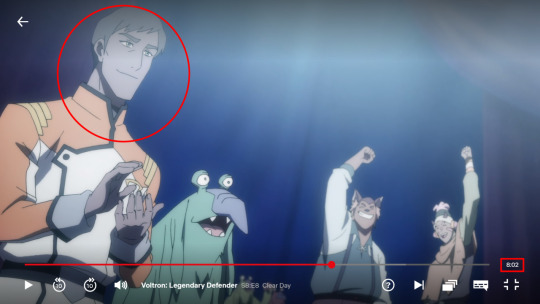
Scene from Episode 13 “The End is the Beginning”
> An important part of Shiro’s body seems to be missing.
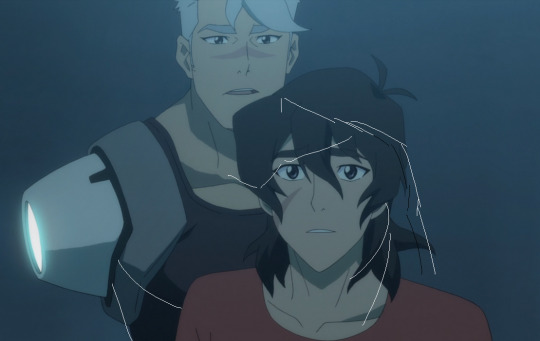
"Curtis”
> Curtis’ name is only mentioned in subtitles
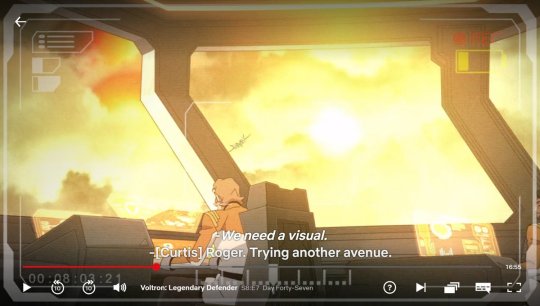
> “Man”
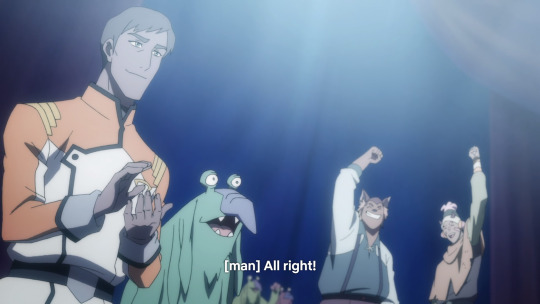
> "A brown hair guy” (click to see the video)
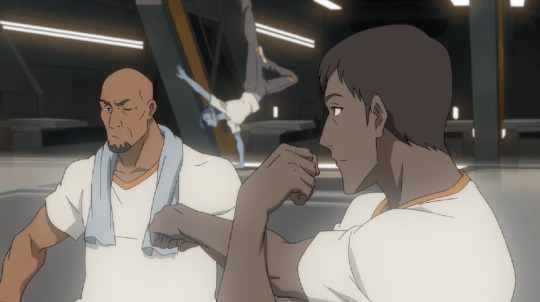
Audio description of Curtis being called Adam (click to see the video)
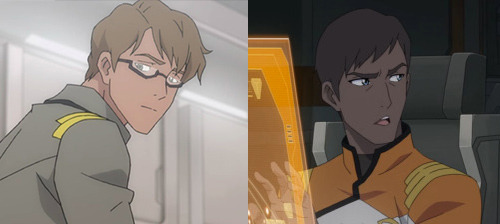
> “Atlas Crewmember”

The NYCC 2018 Poster
Curtis is the only character in a stock image pose.
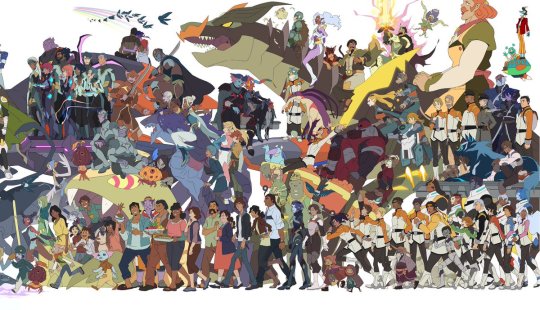
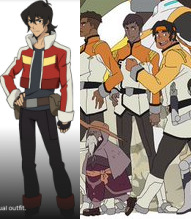
The Wedding(s)
> First post related to the wedding is made by Ryu on September 13th.
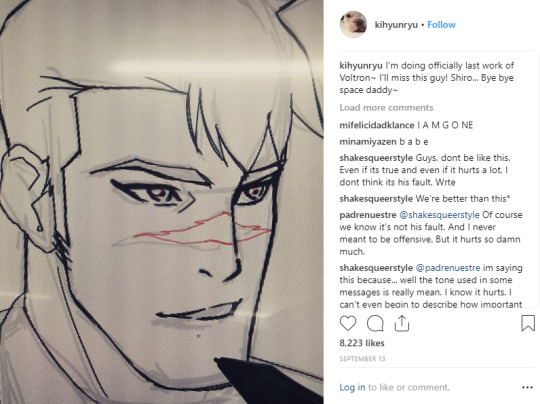
> First leak of the wedding happens 22nd October

> Here’s a comparison of both weddings side by side: (Logos have been censored to prevent being taken down)

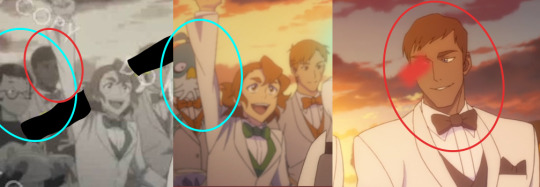
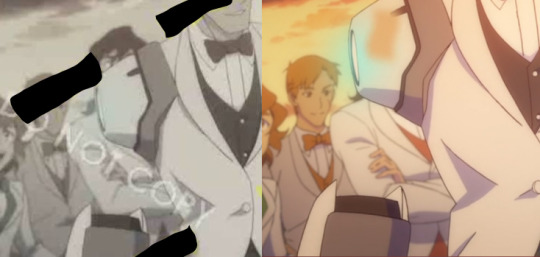
Barlee aka Carli Squitieri, a storyboard revisionist
10th August
> Ezor is dead
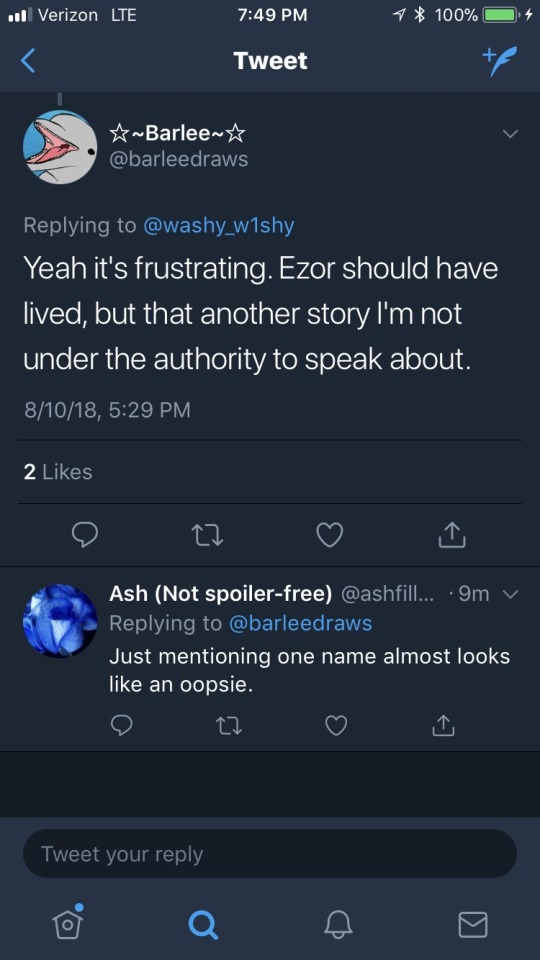
Credits of Episode 5 “The Grudge” (when Ezor shows up alive) with Barlee’s name on it
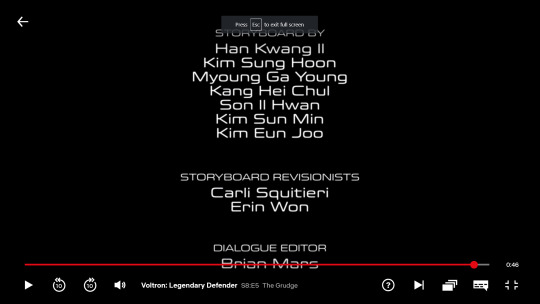
> Shiro being confirmed gay
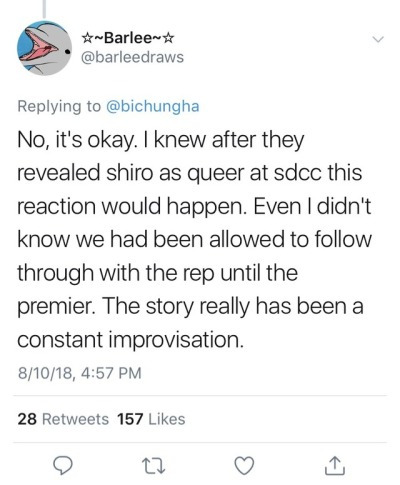
11th August
> “They did what they could to patch it up”
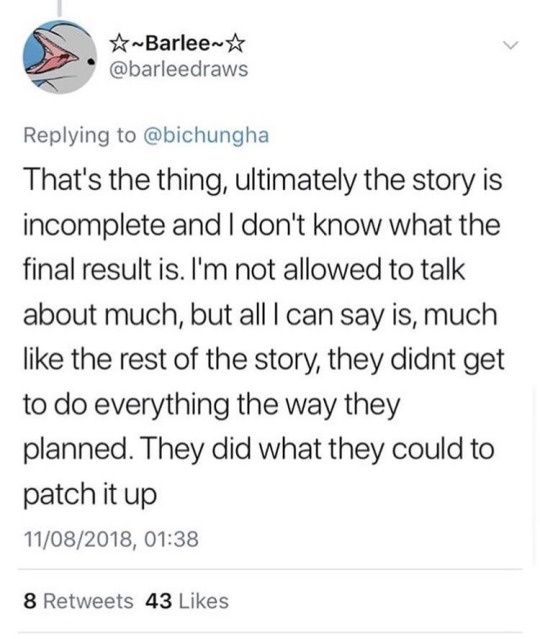
Taekwonsonen’s tweets, a key animator from Studio Mir who worked on Voltron
> Twitter thread can be found here
Translation:
“After talking with a fan who honestly liked the show to the end, I thought about whether VLD was really that terrible enough to be spat on, with cool head.
I’m an animator. Not every animator likes what they’re working on. Some don’t even recognize what they worked on. If an animation is like a house, then animator is the one who does bricklaying. You can be proud of having made this house, but this house belongs to the designer.
Still, as a brick layer who built a house called Voltron, I am so proud and thankful of the series. Maybe if I hadn’t known anyone who cried and laughed along with the series, I wouldn’t be, but I’ve met people who thanked me personally, for laying the bricks. So I love this “house”, even though it isn’t mine.
So, if you ask me, if this house’s finishing touch is feeble, weird, and ‘the worst thing that ever happened’, especially compared to the magnificent, beautiful start, then yes. I agree completely.
But that ‘finishing touch’ is not a little thing. To me, every single brick of the last season is very upsetting. Everything else is good. No, everything else is wonderfully compatible and done very well.
But one small brick has such a different color with everything else, it’s disrupting the whole thing. It’s pulling out every little errors, even the ones I hadn’t noticed before, out in the open. Once again, this is only my opinion.
TBH, if I start rewatching the series from s1 and pick out little bits I don’t like, of course there will be. It’s only that they were so well made, even the errors looked compatible. Actually, I enjoyed watching season 8 to the end. Everyone tried their best and I sent lots of loves and thankyous to the creators. I want to make something like that. I wanted to make something like this, not only as a brick layer but as a designer too. I love this series so much.
The last brick shocked me so much, but still, at that point, I was like ‘that’s disappointing... but without it, it’s ok. They should’ve left it with open ending.’
Then I started talking with other fans, the people who loved and adored Voltron, the one who had high expectation of it. And I started agreeing with the. Yes. They are right. And I still think they are right. Passionate fans didn’t anything that isn’t true.
But on the other hand, is it okay to spit so much like this on the designer who didn’t know this last piece was going to fit so wrongly with the whole series? Maybe. You do you.”
Season Release Date Delayed? Why?
> Information linked to this Voltron shirt
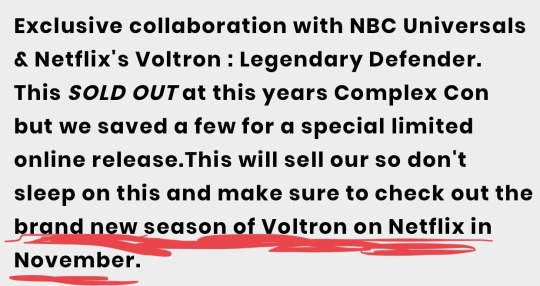
> Text from this article

Lauren Montgomery
> Hours before season 8 premiered, Lauren requests fans to stay through the credits after the final episode, which shown the lions flying to Allura in the sky
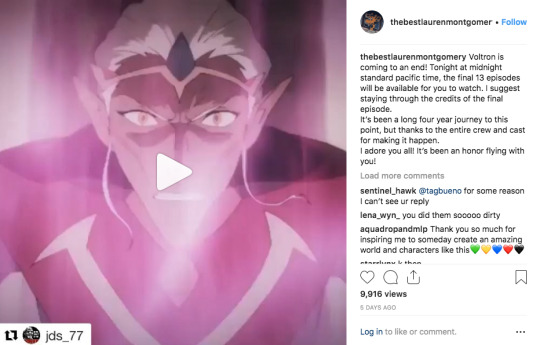
> Lauren’s art for season 8
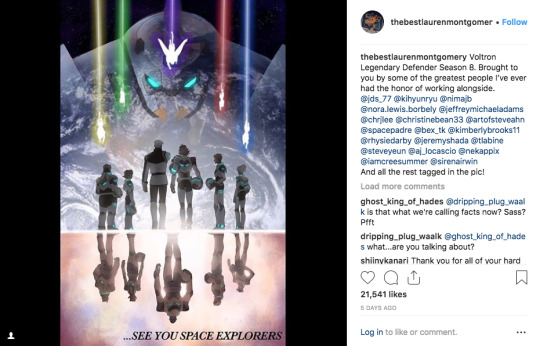
> Lauren’s quote from a video posted on youtube The video was originally deleted, but here’s a record

Quote from the video
“We knew where we wanted to head kind of early on, but then as things happened, and as shows progressed we started to realize that our visions were not the only visions going into this show. And where we thought we would end up was not always exactly how we were going to end up.
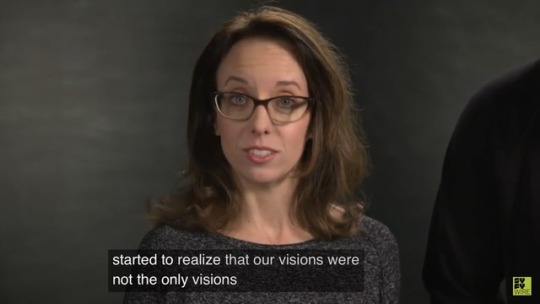
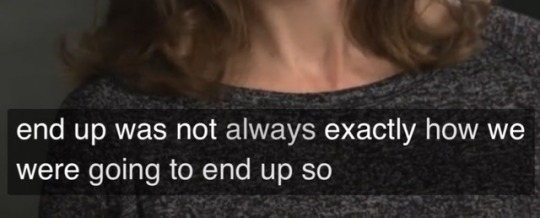
End of Voltron without the epilogue cards
vimeo
We are stronger as a team.
Share this post and the petition through fandom and other fandoms!
2K notes
·
View notes
Text

I love love LOVE PALADIN LOTOR! I have no idea where are all these defensive interviews coming from @voltronofficial ? Either fix the last season or just keep being quiet. #justiceforlotor #lotura #lotor #allura #teampurplelion #FREEVLDS8
378 notes
·
View notes
Photo

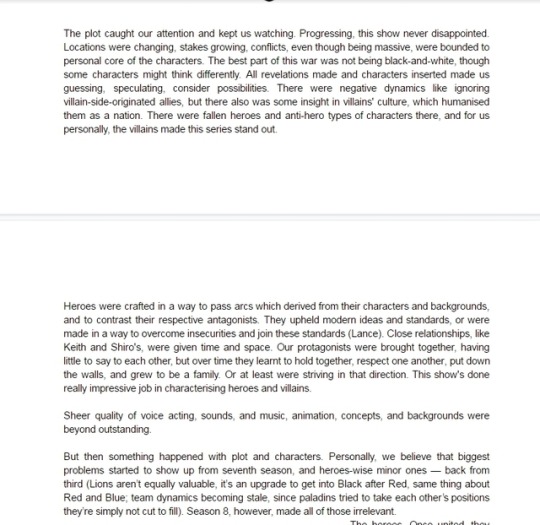

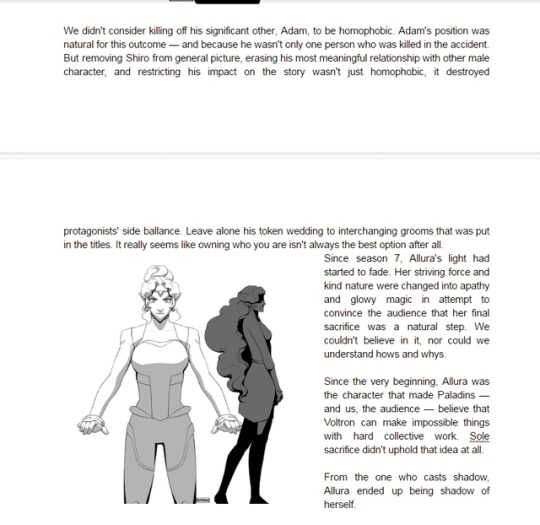

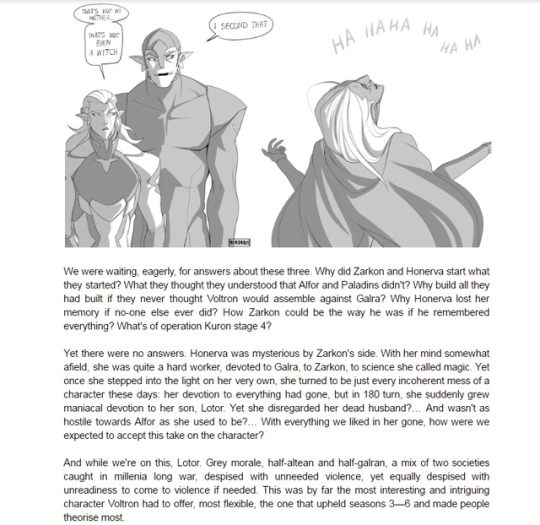
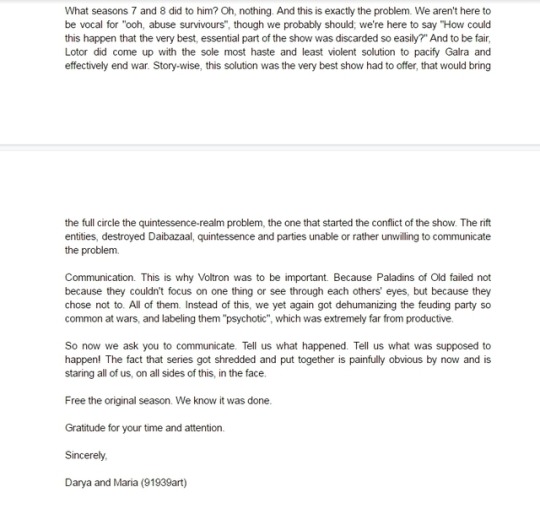
As always, we’re kinda late, but thanks to @ FreeVoltronS8 on Twitter we were able to send an open letter to WEP.
Before writing it down, we didn’t even recognise how much, in addition to all widely stated problems with S8, we hated that woman of science was turned 180 and made into an “obsessed mother”.
Guys from VK, take original from here, and translation from here
137 notes
·
View notes
Text

Oh what a lovely day to awaken to these tags! Thank you for them. It warms my heart to know this post and all the hard work we did is still reaching people who care about this show. It's a rare day that I do not think about this show, and wish we could see the original versions. In retrospect, this post has a lot of issues with it, but many I think are forgivable, given that the main thrust of the post is still true: Season 8 of Voltron Legendary Defender was severely edited post production and one of the main casualties of these edits was Lotor and his associated story.
Do you know, friends, that today, December 7th 2024, is the first day that there is no legal way to experience Seasons 7 and 8 of VLD? it's true. It came down off of Netflix last night, and since it was never released on DVD or available for digital download all copies currently available are those that were illegally downloaded. The only way you can watch VLD S7&8 today is piracy.
You may ask, well, why is that? It should be a simple and relatively inexpensive task to release those seasons for digital download. Why, in the years since their original airing has this never happened?
Well shit, I wish I could tell you, but I don't have any official answers. At this point, all I can do is speculate.
Fortunately, speculation is my forte!
It should come as no surprise that I believe the lack of official copies of S7 and S8 of VLD are a direct result of the edits to both seasons. Yes. Both. When I originally wrote this post, we hadn't connected the dots and realized that Season 7 was edited as well (I covered some of this in my followup post "Seek Truth in Darkness", since a portion of the content cut from Season 7 makes an appearance in Season 8). Whether it's a legal mess behind the scenes holding it up, or a matter of principle (ha!) of DreamWorks not wanting to publish something they were forced to butcher...
Hmm. I don't think I ever came out and publicly said what I believed happened and who was responsible, did I? We alluded to it in a few articles, but never directly stated it. The man in question is notably litigious after all.
*Ahem* Seasons 7 and 8 of Voltron Legendary Defender were edited, post production, on the orders of Bob Koplar, the CEO of WEP (formerly World Events Productions) the company who owns Voltron, the brand, and who leased the adaptation rights to DreamWorks in order for them to make VLD.
Presumably, what happened was that Bob was screened the final cut of the seasons for his stamp of approval (he was not heavily involved in the production despite being named a "Producer" of the show in the credits) whereupon he threw a tantrum and demanded they be changed. His being the CEO of WEP (who, remember, still held the Voltron trademarks) meant that DreamWorks was forced to capitulate to his demands and make the changes. Season 7 was sent back to Mir for the changes to be done professionally, and they're very difficult to pinpoint by animation analysis alone. Season 8, however, was up against a tight deadline and there wasn't time or budget left for proper changes to be made. So they were done with the skeleton team that remained at DreamWorks, and it shows very clearly in both the story and animation. Which is why I could see it, and why the original post could exist at all.
I don't think it's debatable that Season 8 was edited. It's blatantly obvious for anyone who bothers to look and is not under an NDA. The main questions are going to be, what was removed, and why this happened at all.
The answers to these questions are heavily intertwined, as the content removed reveals what was objectionable. As far as I can tell, the two apparently verboten topics were anything involving Lotor's redemption and anything that would potentially cast Voltron-the-robot in a negative light. These topics themselves are intertwined, because it is Lotor's redemption that proves that Team Voltron made a mistake in "defeating" him. As Lotor's VA himself said, "Lotor was framed." Revealing the truth of this would mean that Team Voltron has the potential to be NOT a unilateral force for good, and introduce a grey morality to a previously black and white situation.
In essence: redeeming Lotor would tarnish Voltron's "brand". And this was what was so offensive to Bob Koplar, who is on record saying his favourite character is "the robot".
Bob Koplar does not want it known what he did. Especially as, at this very moment, he is involved with the casting and filming of his long-awaited live-action Voltron adaptation. For sure, he did nothing illegal. In fact it's the very legality of what he did that made it possible - he owned the trademarks, and no one could do something with his property that he did not approve of. But he did something disgusting. He used and abused the creative team of VLD, forced them to butcher their own work, that they had poured their hearts and souls into. He forced them, through non-disclosure agreements, to take the fall for his terrible decisions, and is still refusing to tell the truth about it; he'd rather bury VLD and forget it exists at all.
So thank you, for remembering. For still caring about this show and these characters so many years after we saw it's "end". Maybe some day we'll see the real one.
Chasing the Ghosts of Season 8
Let’s skip the flowery intros and get to the point, because this is important.
Lotor’s vindication and reunion with Allura were originally part of VLD s8 and I can prove it. Most animation relating to this plot was excised, while other clips were re-purposed to make it look like he was dead all along: but some are still in there.
The removal of this plot line was one of the major factors in completely messing up season 8, and it was a change that was made very recently; no earlier than August in fact. There is a significant, non-zero chance that an unedited version of Season 8 exists in its entirety; completely finished.
The evidence is below the cut.
Trigger Warnings: Gore - that image and discussion of it, body horror, sexism, and major character death.

Keep reading
#voltron legendary defefender#vld#bob koplar#team purple lion#lotor#TeamPurpleLion#Hate tries to Meta#executive meddling#FREEVLDS8#fubob
8K notes
·
View notes
Photo

I am so heartbroken that we didn’t get closure for these two, so angry that Lotor didn’t get the vindication he deserved, and I really hope that someday we will be able to see the unedited version of season 8.
Listened to this song the entire time I was drawing this and it broke my frigging heart.
Available as a print in my shop!
451 notes
·
View notes
Text
False Perception: An Analysis of Lance’s Character Arc
When I first started watching Voltron: Legendary Defender in the Fall of 2016, the fact that it was made by some of the same people who worked on Avatar: The Last Airbender was one of the main things that appealed to me. All I knew about the franchise consisted of a throwaway line from Ready Player One and a one-off gag in Deadpool. While I quickly came to love the show for what it was, that familiar blend of drama, action, and comedy that I loved from Avatar played a big part in drawing me into the story.
But while there are some clear similarities and references, it definitely feels like some people have gotten so caught up in the Avatar comparisons that only a few ever acknowledge Voltron as its own thing anymore. Because so much of the criticism I see with Voltron can be distilled to “it didn’t do [blank] the exact same way that Avatar did.”
Yes, a large portion of the production staff worked on Avatar and Legend of Korra. That’s going to have some influence on character design and writing. But still, those influences are just that. Influences. They did not just copy the same plotlines, themes, and characters from Avatar and put them in space. Even without taking into account that it’s a reboot of a decades-old franchise, Voltron: Legendary Defender is still its own show.
It is not the same story as Avatar. It does not tackle the same themes. And any themes it does have in common are not handled in the exact same way that Avatar handled them. Most importantly, the characters of Voltron do not follow the same character arcs as the Avatar characters fans compare them to, nor should they be expected to.
Yes, this is about the “Lance is Space!Sokka” comparisons I’ve been seeing on tumblr for the last four years. I won’t deny that there aren’t similarities between them, but I’m sick and tired of seeing people use the VLD writers not copying and pasting Sokka’s arc into Voltron as an example of “bad writing.”
I get it. Both of them are wisecracking teenage boys who serve as the resident goofball of their team yet will also buckle down and get serious when the situation calls for it. And both of them start out with sexist attitudes that they grow out of over time.
But just because Lance and Sokka are written in similar traits does not mean that Lance’s arc was ever intended to be a beat for beat retread of Sokka’s, and it’s time the fandom as a whole acknowledged this.
I could go on for ages about how many different criticisms of Voltron I’ve seen that ultimately boil down to “it’s not an exact recreation of Avatar.” But for today, I’m going to focus on breaking down the specific trajectory and themes of Lance’s character arc across the entire series.
The first episode establishes that Lance considers himself rivals with Keith, who Iverson specifically said was the best pilot in their class. When Allura explains the traits associated with the lions, he interrupts to suggest that the Blue Lion “takes the most handsome-slash-best pilot of the bunch?” Then in S1E10 Collection and Extraction, he suggests challenging Zarkon to a fight after learning the Galra Emperor’s weaknesses depicts, saying “winner gets the universe.” This is accompanied by an image of Lance standing triumphantly on top of Zarkon’s dead body in front of a flag with Lance’s face and the word “winner” on it. The image includes Allura looking adoringly up at Lance while the rest of the Paladins all give him thumbs up.
Right from the start, Season 1 does a fantastic job setting up Lance’s ego. He’s constantly trying to hype himself up as The Best. The CoolTM one. When Keith criticizes his offscreen kicking of broken ship parts after the team has practiced forming Voltron at the beginning of S1E03 Return of the Gladiator, Lance responds “I did something cool and you can’t handle it.” When Keith points out that Lance’s kick ruined Voltron’s balance and caused the robot to fall over, Lance deflects the blame to Hunk. When he tries to kick Myzax’s orb, he tells Keith to “stop living in the past'' when the Red Paladin reminds him of the earlier fall. His kick misses the orb entirely and results in Voltron getting bashed in the face.
The failed kick during the fight with Myzax serves to set up a pattern that continues over the first two seasons: Lance attempts to make himself look good by performing something he does not have successful experience with, only for his self-aggrandising to screw things up for the team. In S2E04 Greening the Cube, he pushes Hunk out of the way and starts randomly pushing buttons in the middle of the Paladins doing maintenance on the exterior of the Castle of Lions, causing critical problems that Pidge has to quickly fix.
S2E10 Escape from Beta Traz and onward give audiences a peek behind the mask to show that Lance’s bragging and glory seeking is driven by deep-seated feelings of inadequacy. He wants so badly to be SpecialTM and make himself stand out as someone unique and important because he doesn’t believe he’s enough on his own. When the Blue Lion shuts him out in S3E02 Red Paladin he quickly concludes that he must not be meant to be a Paladin at all. When he confesses to the mice in S6E02 Razor’s Edge that he’s in love with Allura he says he can’t compete with Lotor because he’s “just a boy from Cuba” and that he doesn’t have anything to offer in a relationship.
The personas that Lance tries so hard to present himself as - the peerless Special One who single-handedly saves the day and the suave ladies man - are common tropes associated with the protagonists of many science fiction stories. Particularly those with teen and young adult protagonists. Considering that S4E03 Black Site shows Lance as a video game fan and the Paladins were all attending a school for space exploration, it makes sense that he would consciously or not emulate the protagonists of his favorite stories in order to gain acceptance.
But his attempts to seize the limelight end up having the opposite effect. After moments like his attempts to fix the castle in S2E04, the team is understandably skeptical whenever Lance tries to offer a solution to a problem. They’re doubtful when he refers to himself as a sharpshooter in S2E10 Escape from Beta Traz because while the mice and Allura know that Lance has been practicing with his bayard alone - which we see in S5E03 Postmortem - the rest of the team has just seen Lance’s glory chasing. So they’re surprised when he’s able to keep track of their position relative to the lions while being chased by Zethrid in S8E05 The Grudge.
Prior to WEP’s meddling in the final season, Lance’s arc was set up for him to learn the lesson that he does not have to be a genius or a prodigy in order to be valued as a person. That he doesn’t have to be the Super Special Awesome ProtagonistTM in order to be a hero. The reason his arc was so heavily affected by the executive meddling of Season 8 was because his romantic relationships were heavily intertwined with the themes of that arc, and since the edits were heavily focused around Allura and Lotor, Lance’s love life suffered as a consequence.
Over the course of Seasons 1-7, Lance is shown constantly hitting on every beautiful woman he meets. But his romantic pursuits are ultimately shallow. This is best demonstrated in S2E02 The Depths when he recoils after Plaxum kisses him while wearing a bloated jellyfish and ragged cloak, but does a 180 and starts drooling in awe when she takes those off to reveal that her true appearance is much closer to 21st Century American human beauty standards. Even after pouring out his feelings for Allura to the mice in S6E02 Razor’s Edge, he displays no reluctance or inner conflict when he organizes the travel arrangements for the clear purpose of getting to spend time alone with Romelle.
This serves to demonstrate that while he says he loves Allura, his actions show he’s more in love with the fantasy of her and what she represents than he is with her as a person. His flirting with every conventionally attractive female character and his desire to find “the future Mrs. Blue Lion” as he puts it in S2E02 The Depths ties back to his desire for acceptance by emulating your standard sci-fi protagonists because when you look at all the ladies he’s expressed interest in, they all have one thing in common. Each of them fits into common archetypes for female characters in male-centric sci-fi stories.
Nyma is the dark and mysterious femme fatale.
Plaxum is the leader of the rebellion on her planet.
Allura is the alien princess with magical powers.
Romelle is the (assumed) naive newcomer to the war.
Since Lance is emulating traditional character archetypes, it makes sense that he would apply that same emulation to his love life as well, since most of the sci-fi stories which use the tropes Lance’s trying to live up to involve the hero getting the Special Girl. So it makes sense for his character arc to have his endgame love interest be someone other than any of the extra-terrestrial ladies he’s pursued over the course of the series. It has to be someone from Earth, since his desire to return to his home planet was a recurring point throughout the series.
And looking at the series as a whole leaves only one candidate:
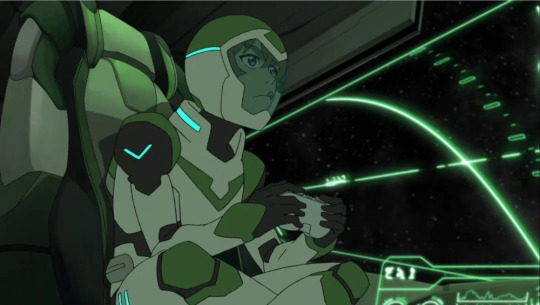
[Image description: Pidge sitting in the Green Lion playing video games during S7E02 The Road Home]
S8E01 Launch Date establishes that Pidge is weirded out by the idea of Lance and Allura going on a date together, but gives up a video game she really wanted in order to barter for an outfit for Allura to make sure the data goes well. During the actual date, Beezer - the robot who had been accompanying Pidge at the beginning of the episode - follows Lance and Allura to the site of their evening walk and takes a photo of them. And though she tries to deny it, in S7E01 A Little Adventure Pidge indirectly admits that she does think Lance is cute.
When Pidge says she thinks the Yalmore is cute in S7E01, her eyes are big in a way that she usually only gets around advanced technology. Her expression when she hastily adds “in a creepy, hideous sort of way, like you Lance,” quickly is frantic and conveys the feeling of awkwardness implying that she hadn’t meant to say it out loud. This brings to mind her words during the mind meld exercise in S1E02 Some Assembly Required when she objects to the Paladins rooting around in her head. Pidge doesn’t like letting other people know what she's thinking and feeling. In that context, her dismissive response to Lance’s navigation skill in S8E05 The Grudge, saying “let’s not get ahead of ourselves” has the same “I’m impressed but can’t bring myself to admit it” energy as Rayla saying that Calumn’s realistically-detailed drawing of the Banther Lodge game room is “okay” in the fourth episode of The Dragon Prince.
Meanwhile in Avatar, Sokka’s arc is focused on dealing with having to grow up fast as a result of his father going off to war and being left to fill the role of the patriarch and protector of his tribe as the oldest boy in the Southern Water Tribe. His insecurities and self-doubts come from a place of wanting to feel like he’s doing a good job at fulfilling the responsibilities that had been forced upon him because of the war.
Lance’s character arc, by contrast, is focused on learning to let go of ego and maturing into someone who recognizes that being able to work as part of a team is more important than individual glory or acclaim. The war with the Fire Nation was a foundational part of Sokka’s life in a way that the fight against the Galra Empire never was for Lance, who doesn’t truly begin to understand what he’s gotten into until S1E05 Fall of the Castle of Lions when he realizes that he may not see his home or his family again for a very long time. As a result, it takes awhile for him to really take the war seriously.
Lance and Sokka do have some traits in common, and it’s valid to point out those similarities. But people need to remember that just because they’re similar doesn’t mean that they’re exactly the same in terms of their character arcs and roles in the overall story of their respective series. The comparisons between Avatar and Voltron were fun at the beginning. I found a few of the posts comparing characters from the two franchises amusing and fun. But since then a lot of fans have felt like they’ve taken those comparisons literally to the point where they expected Voltron to be a rerun of Avatar with a fresh coat of paint.
The Voltron staff may have borrowed or referenced elements from their prior work on Avatar and Korra, but that does not mean that every future project that someone from Avatar makes has to copy the things fans liked about it.
112 notes
·
View notes
Photo

Drake? What? Who’s kissing Shiro? That’s uh... hmmm...
119 notes
·
View notes